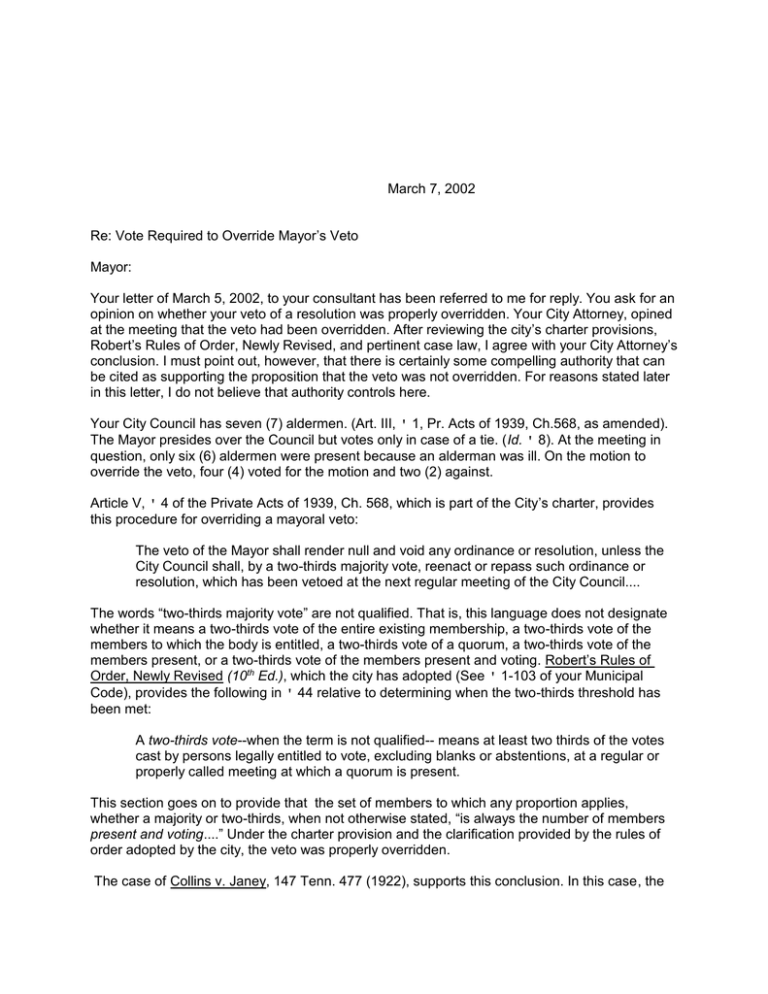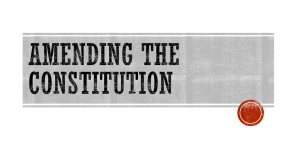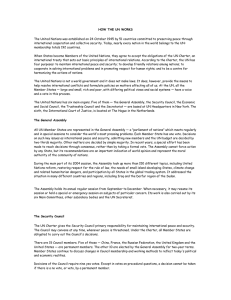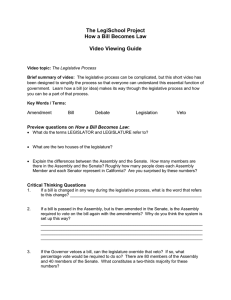March 7, 2002 ’s Veto Re: Vote Required to Override Mayor
advertisement

March 7, 2002 Re: Vote Required to Override Mayor’s Veto Mayor: Your letter of March 5, 2002, to your consultant has been referred to me for reply. You ask for an opinion on whether your veto of a resolution was properly overridden. Your City Attorney, opined at the meeting that the veto had been overridden. After reviewing the city’s charter provisions, Robert’s Rules of Order, Newly Revised, and pertinent case law, I agree with your City Attorney’s conclusion. I must point out, however, that there is certainly some compelling authority that can be cited as supporting the proposition that the veto was not overridden. For reasons stated later in this letter, I do not believe that authority controls here. Your City Council has seven (7) aldermen. (Art. III, ' 1, Pr. Acts of 1939, Ch.568, as amended). The Mayor presides over the Council but votes only in case of a tie. (Id. ' 8). At the meeting in question, only six (6) aldermen were present because an alderman was ill. On the motion to override the veto, four (4) voted for the motion and two (2) against. Article V, ' 4 of the Private Acts of 1939, Ch. 568, which is part of the City’s charter, provides this procedure for overriding a mayoral veto: The veto of the Mayor shall render null and void any ordinance or resolution, unless the City Council shall, by a two-thirds majority vote, reenact or repass such ordinance or resolution, which has been vetoed at the next regular meeting of the City Council.... The words “two-thirds majority vote” are not qualified. That is, this language does not designate whether it means a two-thirds vote of the entire existing membership, a two-thirds vote of the members to which the body is entitled, a two-thirds vote of a quorum, a two-thirds vote of the members present, or a two-thirds vote of the members present and voting. Robert’s Rules of Order, Newly Revised (10th Ed.), which the city has adopted (See ' 1-103 of your Municipal Code), provides the following in ' 44 relative to determining when the two-thirds threshold has been met: A two-thirds vote--when the term is not qualified-- means at least two thirds of the votes cast by persons legally entitled to vote, excluding blanks or abstentions, at a regular or properly called meeting at which a quorum is present. This section goes on to provide that the set of members to which any proportion applies, whether a majority or two-thirds, when not otherwise stated, “is always the number of members present and voting....” Under the charter provision and the clarification provided by the rules of order adopted by the city, the veto was properly overridden. The case of Collins v. Janey, 147 Tenn. 477 (1922), supports this conclusion. In this case, the Marion County school board voted on a contract with the City of South Pittsburg. State law provisions relative to the school board were silent about what constituted a quorum and the number of votes necessary to adopt a measure. The school board apparently had seven (7) members. The vote on the contract was three (3) for, two (2) against, and two (2) abstaining. The question, of course, was whether the contract had been approved. The state Supreme Court held that it had. The Court noted that under the common law, a majority of a body constitutes a quorum and that a majority of a quorum would ordinarily be required to pass a measure. In the circumstance where some members did not vote, however, the Court held that they could not thwart the legislative process. Quoting from 28 Cyc. 339, the Court said: As a general rule, the number of lawful votes actually cast decides the question; so that it is generally held that, if a quorum is present, an election or measure is determined by the majority of the votes actually cast, although an equal or even a greater number refuse or fail to vote. 147 Tenn. at 486. I see no reason the rationale of the Collins case would not apply to a two-thirds vote requirement when the applicable charter provision, as here, does not designate the set of members to which the two-thirds applies. Some complication is introduced into our plot and the answer to your question rendered less certain, however, by the case of State ex rel. Doyle v. Torrence, 310 S.W.2d 425 (Tenn. 1958) and a case that follows it, Kesterson v. McKee, 527 S.W.2d 144 (Tenn. App. 1975). These cases interpret the provision in Article XI, ' 9 of the Tennessee Constitution that requires a twothirds vote to approve a private act by a local governing body. They hold that a two-thirds vote for purposes of this constitutional requirement means a two-thirds vote of the entire authorized membership of the local governing body. The requirement in the Constitution is similar to the requirement in your city’s charter for overriding a veto. It simply requires a two-thirds vote of the local governing body without designating the set of members to which the requirement applies. Since constitutional provisions must be approved by the people, the Court adopted a “man on the street” interpretation of this language. And according to the Court, the man on the street would very simply interpret this requirement as meaning approval by the entire authorized membership of the local body. In my view, however, a constitutional standard for the approval of a private act charter or charter amendment is different from a purely local parliamentary requirement. The Torrence case involved a private act amending Nashville’s charter to provide a pension to a judge. The Nashville City Council had 21 members. The vote on approval of the private act was eight (8) for, two (2) against, and nine (9) present but not voting. The argument of the judge was that the act had gotten two-thirds of those voting as dictated in the Collins case and had therefore been approved. A significant feature that distinguished the Torrence situation from the Collins case, however, was that Nashville’s charter provided for exactly the number of votes required to pass a measure by both a majority and a two-thirds vote. The charter required 11 votes to pass a measure and 14 votes to constitute two-thirds. According to the Court in Torrence this is the reason Collins was not authority for the result: The question though in the Collins case does not determine the question here because in the Collins case the court there [was] dealing with the proposition where the Act was silent as to the number of members necessary to constitute a quorum and under such a situation held as above indicated. Under the Charter of the City of Nashville it is provided that before anything done shall pass that it must have a majority vote which is defined as eleven members affirmatively and for a two-thirds vote it is defined as fourteen members affirmatively. Thus it is that the Collins case is not authority here. 310 S.W.2d at 426. Under Nashville’s own charter requirements, then, the private act in question did not garner enough votes to be approved. The Court, however, does not rely on this local requirement but goes on to establish a constitutional standard for the approval of local acts. Since constitutional amendments must be approved by vote of the people, the Court indicated “we should look to what the ordinary meaning of the language was and what the people who voted for this constitutional amendment would think that the language meant.” 310 S.W.2d at 427,428. Thus the Court came up with its “man in the street” standard for determining what a two-thirds vote of a legislative body means when the body must approve a private act. The Kesterson case extends the rule in Torrence to include situations where there are vacancies on the local body. The Court held that “the constitutional requirement is a two-thirds vote of the authorized membership of the local legislative body.” 527 S.W.2d at 146. The question is whether this “constitutional requirement” and the “man in the street” rule also apply to local parliamentary situations. It is apparent in looking at Torrence that the Court viewed the local requirements as separate from the constitutional standard it established. The local standard was not controlling even though the result would have been exactly the same under the local requirement as that the Court reached. If the local standard had been different and had allowed fewer votes as a two-thirds majority, then the standard established by the Court for approving private acts would obviously have prevailed in this situation, but nothing in the holding of the case would prevent the local standard from applying in other situations. The Court, in my opinion, is establishing a constitutional standard for the local approval of private acts, and extending the ruling beyond that is not warranted. A major reason the Court adopted the “man in the street” rule does not exist in your situation. Article XI, ' 3 of the Tennessee Constitution requires any amendment to the Constitution to be approved by the voters, or the “man in the street” in the Court’s parlance. The voters or “persons in the street”, as we would have to say today, had nothing to do with your Charter provision’s adoption. The section allowing the Mayor the power to veto ordinances and resolutions and providing a procedure for overriding the veto were contained in the original basic charter act in 1939. This was fourteen years before the constitution required local approval of private acts. Therefore, the only body approving this provision of the City’s charter was the General Assembly, a body that itself must follow parliamentary procedure and whose knowledge about the effects of certain requirements and using certain language is somewhat more sophisticated than that of the person in the street. If the General Assembly had wanted to qualify the two-thirds vote requirement in your city’s Charter it easily could have. It chose rather to leave it unqualified and therefore to allow the rules of parliamentary procedure to determine what a two-thirds vote was in any particular situation. Further, the purpose of the local approval requirement in the Constitution is to prohibit “ripper bills,” or local acts that would remove local officeholders from office or reduce or eliminate their salaries or otherwise embarrass the local officials.(See Greenwood and Hobday, An Analysis of Amendments Number 6 and 7 of the Tennessee Constitution, Bureau of Public Administration, University of Tennessee, pp. 27 and 28.) This purpose, of course, does not obtain in a local parliamentary question. This, along with the probability that a charter amendment will have a greater lasting effect upon a local government than a veto or override of a veto, provides a rationale for a constitutional standard for approval of private acts that might be more stringent than those applying to ordinances and resolutions. I believe it also bears mentioning that your city’s Charter requires the veto to be overridden if at all at the “next regular meeting of the City Council.” Art. V, ' 4. This very narrow time frame argues against a stringent rule since Council members often must be absent, and under the constitutional rule of Torrence and Kesterson for approving private acts, absences, vacancies, or abstentions have the same effect as a negative vote on the override. When a municipality requests a private act, the General Assembly passes it, and it comes to the local legislative body for approval, there generally is not a strict time frame attached. The local governing body can arrange to have the necessary votes to approve the measure even though it might have to work around the sicknesses and other scheduling problems of the members. This is not possible under your city’s Charter and could make a veto override only a theoretical possibility. This particular issue has not been before the appellate courts of our state, and there is always the possibility that they would hold that the “man on the street” rule applies here as in approval of private acts. The rule does have an appealing simplicity, but in my opinion it would be better to confine that rule to private act approval and allow local prescriptions, or lack thereof, to apply in matters of only local concern. I hope the information in this letter is helpful. If you have further questions, please call. Sincerely, Dennis Huffer Legal Consultant





